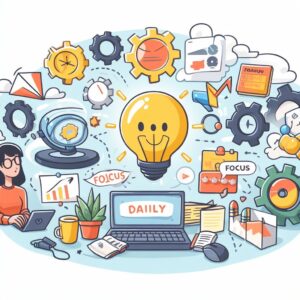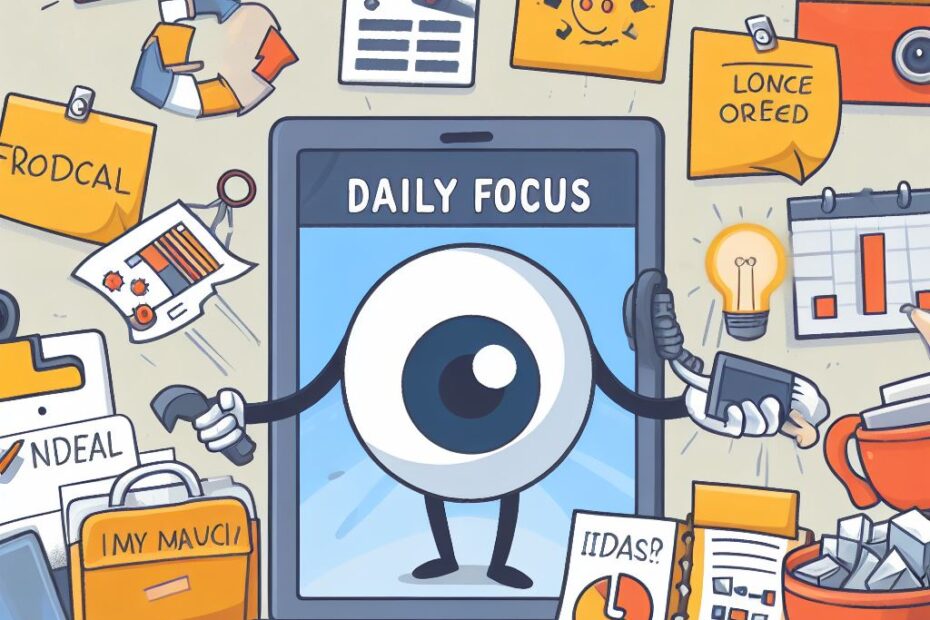This article delves into a variety of daily focus ideas, providing practical advice and tips on how to implement them effectively. In the fast-paced world we live in, maintaining daily focus can be a challenge. With constant distractions and a never-ending to-do list, it’s easy to lose sight of our goals. “Daily focus ideas” are strategies and techniques designed to help individuals maintain their concentration and productivity throughout the day.
Daily focus is a fundamental aspect of productivity and success. In line with a study by the University of California, the average office worker is interrupted every 11 minutes, causing a shift of attention from the original task. This results in an average of 25 minutes spent regaining focus, leading to inefficiency and stress.
Interruptions are an inherent part of work life, fragmenting our time and attention. Our brains struggle to switch focus between tasks, often leaving part of our attention on the interrupted task and not fully shifting to the new demand. This partial attention can lead to poor performance on the interrupting task. To mitigate this, a simple intervention known as a “Ready-to-Resume” plan can be implemented. When interrupted, take a few seconds to note your progress on the task and your next steps upon return. This action gives your brain the cognitive closure it needs to reduce attention residue, enabling you to focus more effectively.
To further enhance focus and productivity, consider the following strategies:
- Establish a morning routine: Starting your day with a set routine can prepare you for the day ahead and boost your productivity.
- Prioritize tasks: Identify and tackle the most challenging tasks first. This approach can increase your sense of accomplishment and boost your productivity throughout the day.
- Create a list of distractions: Identify activities that detract from your productivity and write them down. This list can serve as a reminder to avoid these activities and maintain focus.
- Manage your energy, not your time: Schedule tasks that require your full attention for times when you have the energy needed to focus.
- Take breaks: Taking short breaks can help you refresh your mind and return to work with improved focus and motivation.
- Avoid multitasking: While multitasking may seem efficient, it can actually reduce your ability to concentrate fully on any task. Instead, focus on one task at a time.
By implementing these strategies, you can improve your daily focus, enhance your productivity, and achieve greater success.

The Power of Mindfulness
Mindfulness, a potent tool for maintaining focus, requires individuals to immerse themselves in the present moment without judgment. By cultivating this practice, one can significantly enhance their ability to concentrate on tasks, minimize stress, and substantially boost their productivity. This is achieved by fostering a state of active, open attention to the current moment, being aware of thoughts, feelings, and surroundings without judgment or distraction.
Practicing mindfulness is not an innate skill for everyone, and it often requires conscious effort to maintain focus. One effective way to practice mindfulness is to tap into your senses, particularly when your mind starts to wander. By noticing details in your environment, such as sounds, sights, smells, tastes, or sensations, you can help bring your focus back to the present and refocus your energy.
Moreover, mindfulness has been shown to stimulate the growth of new neural networks in the brain, which can lead to better ways of handling tasks and managing stress and emotions. This increased focus can be attributed to an increase in gray matter in the brain, which holds most of the actual brain cells. An increase in gray matter density may also lead to an increase in connectivity between the cells, thereby enhancing overall psychological well-being.
A mindfulness is a powerful practice that can greatly enhance productivity, creativity, and overall well-being. It requires patience and regular practice, but the benefits are cumulative and often take time to develop. By incorporating mindfulness into daily routines, individuals can experience improved focus, reduced stress, and increased productivity.

Implementing Time-Blocking Techniques
Time-blocking is a potent approach to time management and maintaining daily focus. This technique entails segregating your day into distinct time blocks, each allocated to a specific task or activity. By adopting time-blocking, one can ensure a significant portion of time is devoted to crucial tasks, thereby minimizing distractions and fostering enhanced concentration and productivity.
The method of time-blocking is not a new concept, but it’s still relevant and effective in today’s fast-paced world. It’s utilized by renowned figures like Elon Musk and Bill Gates who are known for their high levels of productivity.
One of the key benefits of time-blocking is its ability to keep you focused and prevent procrastination. It helps you stay on track while keeping distractions and unproductive multitasking at bay. By spending a few minutes each day preparing your calendar for the upcoming day, you can optimize your productivity.
Moreover, time-blocking is not a one-size-fits-all approach. It’s essential to regularly review your time blocks to see if your approach is working for you and to identify which tasks require more time blocks.
By implementing time-blocking techniques can significantly improve productivity by ensuring that sufficient time is dedicated to important tasks, thereby reducing the likelihood of distractions and enabling greater focus.

Utilizing Technology for Focus
Technology, while intrinsically a source of distraction, can also be a powerful tool for maintaining focus. Applications such as “Forest” and “Freedom” offer unique strategies to manage time and minimize distractions, thereby enhancing productivity.
“Forest” is an innovative app that encourages users to stay focused by representing their concentration as the growth of a virtual forest. Each time a user remains focused on a task, a new tree sprouts, symbolizing the growth of productivity. This gamification approach makes focusing more enjoyable and rewarding.
“Freedom” is another application that offers a comprehensive approach to blocking distractions. It can block distractions on all devices simultaneously, ensuring that no potential distractions can interfere with your focus. This application also offers optional focus sounds, providing ambient background noise to further enhance concentration.
In addition to these applications, noise-canceling headphones can create a distraction-free environment. By providing a quiet, isolated workspace, these headphones can significantly enhance concentration, allowing for undisturbed focus on tasks at hand.
A technology can be a powerful ally in maintaining focus. By effectively utilizing apps like “Forest” and “Freedom” and accessories such as noise-canceling headphones, one can significantly enhance their ability to stay focused and productive.

Adopting a Healthy Lifestyle
Sustaining a healthy lifestyle is not just about physical well-being; it’s about cognitive health, productivity, and overall quality of life. Regular physical activity, a balanced diet, and sufficient sleep are essential for maintaining focus and cognitive function. These elements can improve concentration, enhance productivity, and provide the energy needed for daily tasks.
In addition to these, incorporating mindfulness activities like yoga and meditation can further improve cognitive function. Yoga, for instance, can strengthen parts of the brain that play a key role in memory, attention, awareness, thought, and language. Regular yoga practice can lead to improved cognitive skills and may even counteract age-related declines in memory and other cognitive skills.
Meditation, on the other hand, can help manage stress levels, which is crucial for maintaining focus. It can slow the brain aging process and improve cognitive functioning. Regular meditation can also enhance executive functions, such as reasoning, decision making, memory, learning, reaction time, and accuracy on tests of mental acuity.
Incorporating these elements into your daily routine can significantly improve your cognitive abilities, increase your productivity, and ultimately, enhance your overall quality of life.

Regular Breaks for Sustained Focus
Taking regular breaks can significantly enhance focus and productivity, a concept epitomized by the Pomodoro Technique. This technique involves working for 25 minutes, followed by a five-minute break. The underlying principle is that breaks prevent fatigue, maintain mental agility, and foster sustained focus.
The Pomodoro Technique is not just a time management method, but a tool for improving focus and productivity. It encourages users to take breaks, which can improve their attention span.
Moreover, the Pomodoro Technique is not a one-size-fits-all approach. It can be adjusted to suit the needs of the user. For example, for tasks that require extended periods of focus, the work session could be extended while maintaining a longer break. On the other hand, for tasks that are mentally demanding, a shorter work session followed by a shorter break could be more effective.
During the break, it’s recommended to get away from screens and engage in activities that help refresh the mind and body. This could involve physical activities like walking, practicing mindfulness, or social interactions.
To further enhance productivity, the Pomodoro Technique also incorporates the use of rewards. After completing a Pomodoro (a set of 25 minutes of work followed by a 5-minute break), users can reward themselves with a short break, a snack, or any other activity that they enjoy.
The Pomodoro Technique is a powerful tool for enhancing focus and productivity. It involves working in focused intervals (known as Pomodoros), taking regular breaks, and rewarding oneself after each Pomodoro. By adapting the technique to suit individual needs and incorporating enjoyable activities during breaks, users can effectively manage their time and boost their productivity.

Conclusion
Maintaining daily focus is not an easy task, but with the right strategies and techniques, it is achievable. By implementing daily focus ideas like mindfulness, time-blocking, utilizing technology, adopting a healthy lifestyle, and taking regular breaks, individuals can enhance their productivity and achieve their goals.
